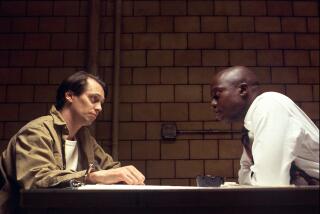The odd pairing of Mike Newell and Jerry Bruckheimer on ‘Prince of Persia’
- Share via
Reporting from London — Mike Newell, the director of “Prince of Persia: The Sands of Time,” the latest pyrotechnic display from producer Jerry Bruckheimer, is standing on a brick path in his English garden when he poses a question to his wife.
“Darling, can I make green tea in this pot?” the 68-year-old filmmaker, clad in tissue-thin blue slacks and black slippers, asks in a lilting accent before popping through a door and into the kitchen. Several minutes later, he emerges with a pitcher of tea and two saucers, his 6-foot-3 frame ambling past the hanging ivy and tinkling fountain that adorn the backyard of his home near Primrose Hill in North London.
If this domestic scene seems a little incongruous — more suited to a starchy British novel than the CG flash of a $200-million summer action movie — it’s for good reason. It would be hard to find a stranger cinematic pairing than Newell, the filmmaking spirit guide behind intimate character studies such as “Four Weddings and a Funeral,” “Donnie Brasco” and “Enchanted April,” and Bruckheimer, the spirit guide behind such extravagant noisefests as “Armageddon” and “Pirates of the Caribbean.”
In fact, the director himself was a little perplexed by the matchup and questioned whether he might be the wrong man for the job after he took it. “I said to Jerry, ‘I think you might have gotten the casting wrong,’ ” Newell recalls. That Newell had previously stewarded a franchise film, 2005’s “ Harry Potter and the Goblet of Fire,” did little to relieve his concerns.
“I felt comfortable with ‘Harry Potter’ because it was an English schoolboy story, and I knew that world well,” Newell says as he takes a seat at a wooden table in the garden. “I didn’t know ‘ Prince of Persia’ at all.’ ”
The fruits of Newell’s education goes on full view this weekend, as Disney releases “Prince of Persia” around the country, after a release-date postponement of nearly a year and an executive housecleaning that saw the deposal of many of the studio officials who shepherded the movie.
Based on a popular video game from creator Jordan Mechner (who was also involved in developing the film) and a script from Boaz Yakin, Doug Miro and Carlo Bernard, “Prince of Persia” concerns a prince named Dastan ( Jake Gyllenhaal) who is framed for the murder of his father, prompting him to flee to the desert. It also tracks Dastan’s relationship with his two brothers (Richard Coyle and Toby Kebbell), his prickly courtship of an enemy princess (Gemma Arterton), a complicated dynamic with his uncle Nizam ( Ben Kingsley) who may or may not be Dastan’s ally and — naturally — a dagger with the ability to turn back time.
As many of the reviews have noted, the film contains plenty of Bruckheimer trademarks with just scattered touches of Newell; overflowing with grand spectacle, effects-heavy battles and emotional crescendos, while sprinkling in only a few dollops of character (as a street urchin who is adopted into a royal family, Dastan evinces both toughness and vulnerability), and cinematographic nuance.
If there is an imbalance between Bruckheimer and Newell influences, there’s a reason for that too. The collaboration was not without its hiccups, in particular, a creative disagreement between Newell and Bruckheimer that led to the hiring of an outside editor, Michael Kahn, to work on the film for several weeks, without Newell’s involvement, after the director had turned in his cut. “I had been very happy with the stuff I had produced but Jerry clearly wasn’t,” Newell recalls. “What he said was, ‘My ... detector goes off.’ ”
For his part, Bruckheimer says the decision to re-cut Newell’s version was born not of dissatisfaction but by his desire to make a film that fit his typically large-canvas aims. “I always want to bring in people who know how to make a big movie, and Michael Kahn knows how to do that from working with [ Steven] Spielberg,” Bruckheimer says. “I thought it was a good thing, and Mike [Newell] agreed.” (Bruckheimer says he hired Newell in the first place because “he brings such versatility, and we’re always trying to think outside the box with our movies.”)
In the end, Kahn’s involvement meant that about 10 minutes from Newell’s cut didn’t make it into the film, particularly sweeping desert shots that, as Newell describes them, suggested the scope of a classic Hollywood epic.
Talking to Newell, one gets the sense of a man torn between candor and diplomacy, between airing grievances about how much (or little) room Bruckheimer gave him and playing the good soldier who walked in, eyes wide open, to work for one of the most assertive producers in Hollywood.
“I don’t have a rock to get off my chest,” Newell says, his swoop of sandy hair variously pointing in several directions, like a weathervane, in the afternoon breeze. “I knew all along what I was getting into making a film in the Bruckheimer genre. Jerry’s a terrier. But he’s not a bully. He’s just in the service of a 16-wheel truck called ‘The Jerry Bruckheimer Movie.’ ”
As a result, Newell says, he can’t fault the producer. “It’s all very well for me to moan on about atmosphere in the desert and wonderful long shots. This guy [Bruckheimer] has to make hundreds of millions of dollars before he’s even out from under the lash.”
Still, it’s hard not to detect a degree of remorse in Newell’s voice. If this type of unlikely Hollywood collaboration begins because each side wants something from the other — a producer of blockbusters craves the seriousness that an artist brings, while an artist wants the producer’s hitmaking touch — it can often end with the more powerful party prevailing.
“My view of this film is as a romance, and I wanted more atmosphere in it,” Newell admits. The director also describes working on a picture like “Prince of Persia,” which was shot with a cast and crew of hundreds in Morocco and used numerous CG effects, as “a little bit like being the head of the Ford Motor Co. They bring you designs all day and you say, ‘Do you have this in blue?’”
Given how much awareness Newell had about what he was signing on for — and some of his unease therewith — the question remains: Why did he do it? On this, candor prevails. “Let’s be honest. A big part of the reason why I took on ‘Prince of Persia’ is because the last movie was such a colossal flop,” he says, referring to 2007’s “Love in the Time of Cholera,” a much-troubled adaptation of the Gabriel Garcia Marquez novel that earned only $4.6 million in the U.S.
After so much adaptiveness, one gets the sense Newell is eager to return to more intimate terrain. It’s why three new projects he’s next considering — an adaptation of a Charles Dickens novel, a children’s adventure story and the true tale of a Russian agent caught in the cross hairs of the mafia — are not likely to be confused with Bruckheimer movies.
Still, Newell is attempting to maintain a different British trait: a glass half-full type of stoicism. He says that, despite all the ups-and-downs on “Persia,” he relished the chance to try his hand at a new genre. “When do you ever get a chance to do a cavalry charge?” he says.
More to Read
Only good movies
Get the Indie Focus newsletter, Mark Olsen's weekly guide to the world of cinema.
You may occasionally receive promotional content from the Los Angeles Times.











